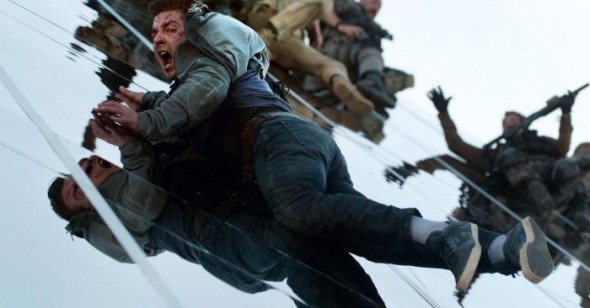Tuesday Hangover
Transformers: Dark of the Moon
By Jeff Reichert and Farihah Zaman
Upon exiting Transformers: Dark of the Moon, I couldn’t help but think back on James Marsh’s new documentary Project Nim, which I’d seen earlier that evening. In his latest overlong warring-robots opus, Michael Bay, film culture’s favorite punching bag (or is it now Brett Ratner?) has created perhaps the purest expression yet of his particular gift for the hyperbolic spectacular, yet in so doing has reminded me of Marsh’s tragic primate protagonist. Orphans and primitives both, Bay and Nim approach their respective means of communication—cinema and signing—awkwardly, and from a removal; their resulting control over their languages often suggests clever mimicry instead of true language. Thus, in Michael Bay films, humorous moments don’t even seem to be trying for funny, they’re just efficiently sadistic (here, watch as a vulture-like robot attempts to dispatch a conspiracy-fearing Ken Jeong and make it look like a suicide—ha ha!); sexuality is shorn of Eros in favor of coldly machine-tooled desire (a sleazy Patrick Dempsey describes the curves of a car to Shia LaBeouf, yet Bay’s camera is fixated on Rosie Huntington-Whiteley’s shapely midsection). Outsized, kneejerk patriotism and unyielding climactic spectacle are of paramount importance (the invasion and destruction of Chicago, a rather inexplicable target, plays out over an interminable third act). It’s all here, and there’s more of it than ever.
Although there’s a purity of expression to Transformers: Dark of the Moon, it still fails at the most simple, yet complicated of an artist’s tasks: locating humanity. Instead, Bay shows a craven hunger for excess, which does lead to amusingly bonkers sequences like the film’s opening, in which he reimagines the Apollo 11 landing as a space race to locate a robot ship on the back of the moon, via a blend of actual period newsreel, two different textures of phony archival (he leaves no depth of tastelessness unplumbed, even hiring actors to play JFK and Nixon and intercutting the performers with the real men), and various tossed off second unit stuff of folks dressed in bowling shirts and pencil skirts cheering as rockets blast off into the stratosphere. For me this leveling of cinematic registers surprisingly recalled the climax of Godard’s Film socialisme—though one of these films is more humorless than the other about its historical appropriations. Guess which?
Then again perhaps this is too lofty a claim for a film in which the villain, Megatron, smashes the Lincoln Memorial in a fit of pique (and is inexplicably swaddled in a torn and dirtied hobo cape throughout the film); one of hero Optimus Prime’s arms is severed in a climactic battle (his fearful cry remains the film’s only moment of true pathos); Shia LaBeouf delivers every line with a seemingly cocaine-fueled scream; and poor Rosie H-W seems to be around only to call a giant robot a “bitch.” This is primeval filmmaking at its best/worst. Nim would probably love it; I left the theater far from edified or illuminated, yet still sated, as after consuming a pile of cheap Chinese food. One small step for Bay, one giant leap for... —JR
Oh, Jeff, if only the film rushed headlong towards its multiple climactic spectacles, as opposed to writhing around in a pit of leaden exposition (I haven’t seen the first two films in the series and even I found the backtracking redundant); half-baked plot contrivances that must have been especially humiliating for Frances McDormand; and jokes at the expense of nearly anyone who isn’t white, straight, male, and kind of a fucking dick.
I found the tenor of much of the humor to be not just unfunny but also downright offensive. The Patrick Dempsey sequence you mentioned was simply the apotheosis of the film’s consistently smarmy male gaze, which presided over a movie whose female characters stick to the tissue-thin archetypes of Hot Girlfriend, Overbearing Mom, and Androgynous Ball-buster. The gratingly winking references to the ousting of Megan Fox—the protagonist’s father sums it up: “That girl was hot, but what a bitch”—just added to the sexist din. Homophobic jokes abounded in a way that served as an unpleasant reality check to my naiveté regarding Hollywood’s willingness to call out its own lazy bullshit. And don’t get me started on Ken Jeong’s character, who runs around embodying stereotypes like some kind of one-man Asian minstrel show, and whose faked suicide is tastelessly and ineffectively treated like the climax of some madcap vaudeville routine.
There are a few points of interest, including the winking historical revisionism that seems to be a feature in many big action films this season, including X-Men: First Class and Captain America. Though Buzz Aldrin’s recent appearances on 30 Rock and WWF have made him somewhat overexposed of late, his cameo managed to provide a childlike thrill. And I could at least turn my attention to the costuming: the wardrobing in contemporary film has long been notoriously overlooked by the Academy, and the work here by Deborah Lynn Scott (who also worked on Titanic, Minority Report, and Avatar) deserves a shout-out, as it was appropriately but not excessively campy, allowing certain characters to be subdued, like LaBeouf’s quietly rugged all-American checked shirts and jeans, and others to go flamboyant, like John Turturro’s studded leather. But since most viewers will not be focusing on the film’s sartorial choices, I should probably mention instead the over-the-top action sequences with their sounds of shattering glass and crunch of crushing metal. But for me getting there was excruciating. I’ll take the pseudo-intellectual history-nerd antics of a National Treasure film over this rusty hunk of scrap metal any day. —FZ
